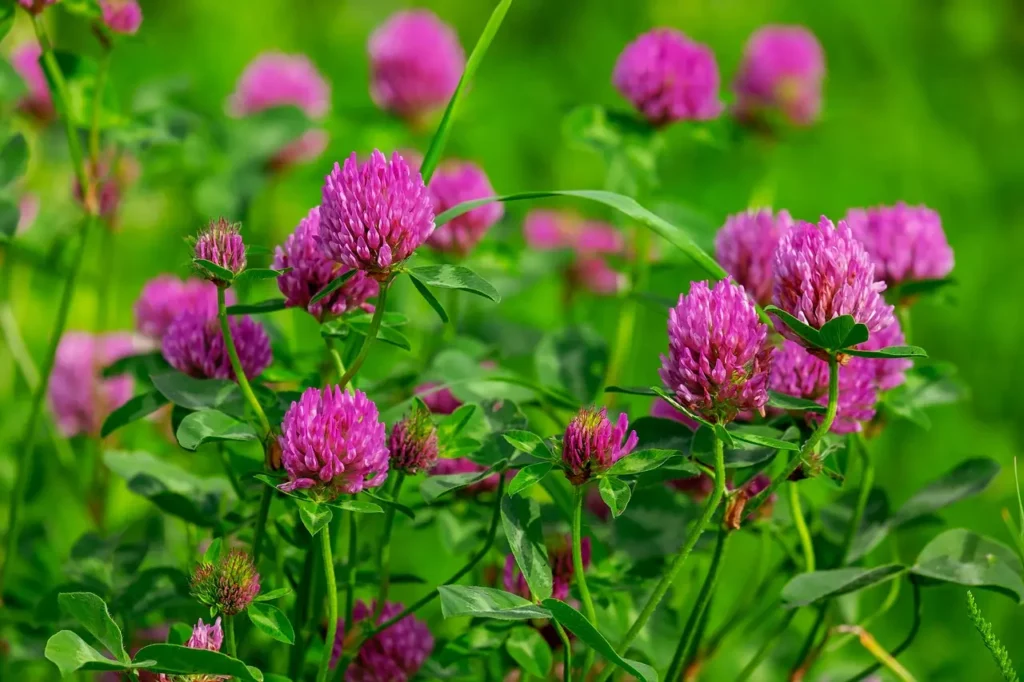Maintaining a lush and healthy lawn is a desire shared by many homeowners in North Carolina. However, one persistent challenge that often frustrates these aspirations is the unwelcome invasion of clover.
With its distinctive three-leafed clusters and rapid spreading tendencies, clover can quickly take over your lawn, detracting from its aesthetic appeal and impeding the growth of desired grass species. Fortunately, our lawn care experts from FortSmith Landscaping are sharing several effective methods and teaching you how to get rid of clover and reclaim the beauty of your lawn.

What Is Clover and Why Does It Appear in Lawns?
Clover is a low-growing perennial weed characterized by its distinctive three-leafed clusters. It commonly appears in North Carolina lawns because the state’s climate, characterized by warm summers and mild winters, provides favorable conditions for clover growth.
The Negative Effects of Clover on the Aesthetics and Health of Your Lawn
Here are some key reasons why clover is generally considered undesirable in lawns:
- Appearance: Clover’s distinct three-leaf clusters stand out against the backdrop of traditional grass blades, creating an uneven and patchy appearance.
- Competition with Grass: Clover is an aggressive weed that competes with grass for essential resources such as water, nutrients, and sunlight. Its rapid spreading tendencies can choke out desirable grass species, leading to thinning and bare patches in the lawn.
- Impact on Lawn Health: As clover takes over, it forms a dense mat of foliage that shades the underlying grass. This shade can hinder the photosynthesis process, weakening the grass and making it more susceptible to stress, disease, and weed invasion.
- Nitrogen Imbalance: While clover has the ability to fix nitrogen from the air, it often results in an imbalance within the lawn ecosystem. Clover’s nitrogen-fixing capability can lead to an excess supply of nitrogen, causing grasses to grow too quickly and become lush but weak.
- Difficulties in Lawn Care: Clover’s resilience and tolerance to many common lawn care practices, such as lawn mowing and herbicide treatments, can make it challenging to control.
How Clover Can Spread and Take Over Surrounding Grass
When clover thrives, it spreads and takes over the surrounding grass through seed production, rhizomes, stolons, nitrogen fixation, tolerance to mowing, and resilience to environmental stress. The abundant seeds of clover can be dispersed and germinate, leading to new clover plants.
Clover Removal Techniques
In order to get rid of clover from your lawn, there are several techniques you can employ.
Manual Removal
For small areas or isolated patches of clover, manually pulling the weeds by hand or using a hand tool, such as a dandelion weeder, can be an effective approach. Ensure that you remove the entire root system to prevent regrowth.
Regular Mowing
Maintaining a regular lawn mowing schedule helps to prevent clover from flowering and setting seeds. Set your mower to a height that promotes strong grass growth, as taller grass can shade out clover and inhibit its spread.
Improving Soil Conditions
Clover often thrives in nitrogen-deficient soil. Conduct a soil test to determine nutrient levels and apply a balanced fertilizer accordingly. By improving soil fertility, you can help grasses outcompete and eliminate clover and create a healthier lawn.
Overseeding
Introducing more desirable grass species to your lawn through overseeding can help fill in bare areas and reduce the space available for clover to establish itself. Choose grass species that are well-suited to your region and lawn conditions for optimal results.
Herbicide Applications
Selective herbicides formulated specifically for broadleaf weed control, including clover, can be effective in larger infestations. Follow the instructions carefully and choose herbicides that are labeled safe for your grass type. Spot treatment may be preferred to avoid harming the surrounding grass.
Organic Remedies
If you prefer organic alternatives, there are natural options available. These include using vinegar or boiling water as a spot treatment, applying corn gluten meal as a pre-emergent herbicide, or introducing beneficial nematodes to target the clover’s root system.
Herbicides Specifically Designed to Kill Clover
Herbicides designed specifically to kill clover are effective tools for controlling and eliminating clover infestations in lawns. These herbicides contain active ingredients that target broadleaf weeds like clover while sparing the desirable grass species.
Important Considerations and Precautions When Using Chemical Treatments
- Read and Follow Instructions: Adhering to the recommended rates, application methods, and safety precautions is essential for both effectiveness and safety.
- Proper Application: Apply herbicides on a calm day to prevent drift onto desirable plants. Use appropriate spraying equipment, such as a sprayer with a fan or nozzle suitable for spot treatments. Avoid over-application, as it can harm the lawn and the environment.
- Personal Protective Equipment (PPE): When handling herbicides, always wear the recommended PPE, which may include gloves, long-sleeved clothing, protective eyewear, and a mask. PPE helps minimize exposure and protects your health.
- Environmental Considerations: Avoid treating near water bodies, storm drains, or areas where runoff can occur. Consider using organic or environmentally friendly alternatives if you have concerns about potential impacts.
Organic Approach: Corn Gluten Meal
Corn gluten meal is a natural, organic weed killer that can be used as a pre-emergent herbicide to prevent clover growth in your lawn.
Benefits of Using Corn Gluten Meal in Preventing Clover Growth
- Weed Prevention: Corn gluten meal acts as a natural pre-emergent herbicide, inhibiting the germination of clover seeds. It forms a barrier in the soil that prevents newly sprouted clover from establishing itself in your lawn.a
- Nitrogen Source: Corn gluten meal is rich in nitrogen, providing a slow-release nutrient source for your grass. It helps promote healthy grass growth while inhibiting the growth of clover and other weeds that typically thrive in nitrogen-deficient soil.
- Environmentally Friendly: Corn gluten meal is an eco-friendly alternative to synthetic herbicides. It is derived from corn and is safe for children, pets, and beneficial insects when used as directed.
Application Instructions and Dosage Recommendations for Optimal Results
- Timing: Apply corn gluten meal in early spring and late summer/early fall as part of your spring lawn preparation. These are the optimal times to prevent the germination of clover seeds.
- Preparation: Before applying corn gluten meal, make sure the lawn is freshly mowed and free of debris. It’s best to remove any existing clover patches manually before applying the treatment.
- Spreader Application: Use a broadcast spreader to evenly distribute corn gluten meal across the lawn. Follow the manufacturer’s instructions for the specific spreader setting.
- Dosage: The recommended application rate for corn gluten meal is typically 20 pounds per 1,000 square feet of lawn. However, always refer to the product label for the precise dosage instructions, as they may vary among brands.
- Watering: After application, lightly water the lawn to activate the corn gluten meal and ensure it settles into the soil. This helps it form a barrier against clover seed germination.
- Repeat Applications: For effective control, it is necessary to apply corn gluten meal twice a year, in spring and fall, to continuously suppress clover seed germination.
Promoting Healthy Surrounding Grass
Promoting the health of your surrounding grass is crucial for maintaining a vibrant and weed-resistant lawn.
Proper Mowing
Set your mower at the appropriate height for your grass species and regularly mow to encourage strong and dense growth. Avoid cutting the grass too short, as it weakens the plants and allows weeds like clover to establish themselves.
Regular Watering
Provide your lawn with consistent and deep watering to support healthy root development. Water deeply and infrequently, aiming for about one inch of water per week. This encourages grass roots to grow deeper, making them more resilient to weed competition.
Adequate Fertilization
Apply a balanced fertilizer according to your grass type’s specific needs. Proper lawn fertilization provides essential nutrients for grass growth, helping it to outcompete weeds like clover. Follow the recommended application rates and timing instructions for best results.
Core Aeration
Periodically aerate your lawn to alleviate soil compaction and improve air circulation, water infiltration, and nutrient absorption. This process promotes deeper root growth and helps grass withstand weed pressure, including clover invasion.
Overseeding
Introduce new grass seed to your lawn through overseeding. Choose high-quality grass seed varieties that are well-suited to your region and lawn conditions. Overseeding fills in bare areas, increases grass density, and reduces space available for clover to establish.
Soil Testing and Amendments
Conduct a soil test to assess the nutrient levels and pH balance of your soil. Based on the results, add necessary amendments such as lime or sulfur to adjust the pH and ensure optimal nutrient availability for grass growth.
Weed Control
Implement effective weed control strategies, including manual removal, broadleaf herbicide application, and preventive measures like corn gluten meal to kill weeds. Combining these approaches helps maintain a healthy grass environment and reduces weed competition.
Regular Maintenance
Regularly remove debris, such as leaves and grass clippings, to prevent thatch buildup and allow air and nutrients to reach the soil and grass roots. Additionally, address any invasive pest or disease issues promptly to prevent them from weakening the grass and creating opportunities for weeds to thrive.
Achieve a Lush, Clover Free Yard with FortSmith’s Complete Lawn Care Services
Are you tired of dealing with unsightly clover patches ruining the beauty of your yard? Do you dream of achieving a lush, clover-free lawn that becomes the envy of your neighborhood? FortSmith’s weed control services are here to help you transform your lawn into a weed-free paradise.
Our team of experienced lawn care professionals understands the unique challenges faced by homeowners in maintaining a pristine lawn, especially when it comes to stubborn clover infestations. With our expertise and specialized techniques, we have the knowledge and tools to tackle even the toughest clover problems.
Contact our Wake Forest, NC landscaping company today by calling us at (919) 228-8495 or filling out the form below to get started.
